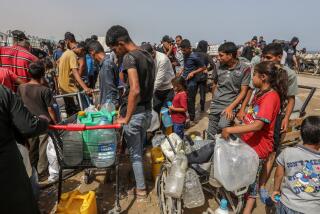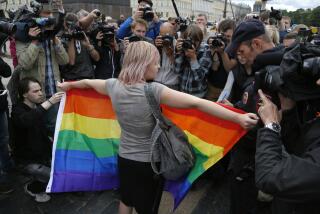Egypt court bans all Muslim Brotherhood activities
- Share via
CAIRO — For most of its 85-year history, the Muslim Brotherhood has been an outlawed organization. Now it has come full circle.
The Islamist movement, which soared to undreamed-of political heights when one of its leaders became Egypt’s president last year, suffered a decisive blow Monday when an Egyptian court banned all of its activities and ordered the confiscation of its financial assets. It was among the current government’s most sweeping measures yet against the group, most of whose leaders have been jailed on serious charges, with thousands of its followers dead or in hiding.
But what remains to be seen is whether this latest move by an increasingly authoritarian interim government will provoke a backlash, enhancing the movement’s prestige in the eyes of supporters, and stiffening the resolve of its remaining followers.
In the chaotic power vacuum that emerged after longtime autocrat Hosni Mubarak was toppled in 2011, the Brotherhood managed to propel one of its own to power: Mohamed Morsi, who spent a turbulent year at the country’s leadership helm. In July, riding a wave of public sentiment, the military overthrew Morsi, Egypt’s first democratically elected president; in August, Egypt’s security forces killed about 1,000 Brotherhood partisans who had set up ragtag protest camps in Cairo and elsewhere.
Monday’s court ruling, the text of which was made public by the state news agency, included a broad-ranging indictment of the Brotherhood’s “abuse and arrogance” during its months in power, and a ringing endorsement of the coup that brought Morsi down.
Pressure on the group had heightened in the last week after separate court rulings froze several top leaders’ assets, and its most visible English-language spokesman was picked up by police. The latest ruling paves the way for authorities to move separately against the movement’s many branches, with the likely effect of driving its adherents even deeper underground.
“It’s another weapon in the legal battle” against the Brotherhood, analyst and human rights activist Hossam Bahgat wrote on his Facebook page after the ruling was issued.
Morsi’s ouster was greeted with relief by many Egyptians, who were alarmed by both his inept governance and unsubtle efforts to “Brotherhoodize” a devout but cosmopolitan populace. The main mover and shaker in Egypt now is the army chief, Gen. Abdel Fattah Sisi, who engineered the coup.
Over the last month, the Egyptian police and army have launched repeated raids on what they describe as Islamist militant strongholds in the Sinai Peninsula, the Nile Valley, and most recently on the outskirts of Cairo, near the pyramids of Giza. The wave of offensives resulted in hundreds of arrests, as have separate sweeps in the capital and other major cities. Human rights groups have sharply criticized the harsh conditions under which the detainees are held.
Morsi faces murder-related charges and has been held all but incommunicado since the coup, speaking last week with his family for the first time since the military seized him. He reportedly told his wife and son he still considers himself Egypt’s rightful president.
Authorities have portrayed those captured in security raids as criminals and terrorists who were allowed to flourish under Morsi’s rule. A senior Egyptian police commander killed last week in an offensive in a town near Cairo has been hailed as a national hero, and Sisi’s backers are clamoring for him to run for president. He has not yet said whether he will do so.
The comprehensive ban on Brotherhood activities suggests that the interim government has no intention of trying to re-entice the group into its short-lived public role as an ostensibly peaceful political entity, but rather is determined to crush it altogether, as Mubarak tried for decades to do. During Morsi’s rule, the long-standing ban on the group was never technically lifted, though it was given status as a nongovernmental organization, which allowed it to operate openly while leaving its formal standing somewhat ambiguous.
The Brotherhood had gained a loyal popular following over the years by providing, through affiliated groups, a range of social services — clinics, soup kitchens, hospitals — that targeted the poorest of Egypt’s poor. But the court, closely echoing language employed by senior officials in the interim government, accused the movement of using Islamic precepts as a “cover” for illicit activities, saying the army had rightly acted against it.
“The people took shelter in their armed forces, the sword and shield of the nation,” the judge declared.
Hassieb is a special correspondent.
More to Read
Sign up for Essential California
The most important California stories and recommendations in your inbox every morning.
You may occasionally receive promotional content from the Los Angeles Times.










